
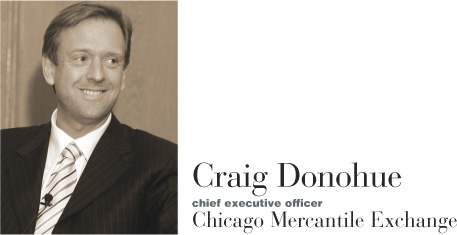
| Craig Donohue is chief executive officer at the Chicago Mercantile Exchange, known as the Merc. Founded in 1898 as a not-for-profit corporation, the Merc became the first publicly traded financial exchange in the United States in 2002. Today, it is the largest futures exchange in the country, and the largest futures clearinghouse in the world. Mr. Donohue, who joined the Merc in 1989 as a lawyer and held a series of legal and managerial posts before being named CEO in January 2004, has played a leading role in the Merc's transformation. A graduate of Drake University, he holds an MBA from Northwestern's Kellogg Graduate School of Management, a JD from John Marshall Law School, and an LLM in financial services regulation from ITT Chicago Kent College of Law. In February, he appeared at NYU Stern to discuss the Merc's transformation with students and faculty. Mr. Donohue was interviewed by Jeffrey Kutler, assisting managing editor of Institutional Investor magazine. |
Jeffrey Kutler: When you joined the Chicago Mercantile Exchange in 1989, you got a job there as an attorney. Did you have any idea what you were in for over the next decade and a half?
Craig Donohue: I had practiced corporate securities law, and had become very interested in derivatives. But I had no idea what the Merc was. I thought it was just a place where they traded cattle, hogs, and probably pork bellies. As I got there, I realized it was actually this enormous institution. In 2004 we did about $463 trillion of financial trading. I knew that I had a lot of opportunity there just because we were growing so rapidly. As time went by I really felt I had the ability to take the Merc to a different level – to go beyond being a mutual organization with a floor-based trading background.
JK: What happens in Chicago? What is the comparative advantage?
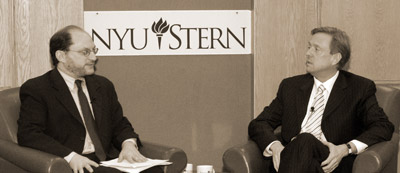 CD: Our distinctive advantage was our origins and our understanding that we can facilitate risk transfer in a way that is efficient and valuable to market participants. It started with agricultural products. For the last 150 years, people have been wanting to protect against the risk that there would be too much supply of crops at the time that they actually came to harvest. We started out trading butter and eggs on South Water Street. We actually had to deliver the butter and the eggs. And then we evolved into livestock. There was a major innovation by Merc Chairman Leo Melamed in the 1970s where we took the concepts of hedging and risk transfer that farmers and agricultural producers had been using for decades and decided they had an application in financial instruments: foreign exchange, interest rates, Treasury notes, and bonds.
CD: Our distinctive advantage was our origins and our understanding that we can facilitate risk transfer in a way that is efficient and valuable to market participants. It started with agricultural products. For the last 150 years, people have been wanting to protect against the risk that there would be too much supply of crops at the time that they actually came to harvest. We started out trading butter and eggs on South Water Street. We actually had to deliver the butter and the eggs. And then we evolved into livestock. There was a major innovation by Merc Chairman Leo Melamed in the 1970s where we took the concepts of hedging and risk transfer that farmers and agricultural producers had been using for decades and decided they had an application in financial instruments: foreign exchange, interest rates, Treasury notes, and bonds.
The other advantage is talent. We have thousands of people who grew up at the Chicago Board of Trade, or the Merc, or the Chicago Board of Options Exchange – where the first equity options began to trade. And so there's a tremendous intellectual talent pool of people in Chicago who understand how to trade derivatives.
JK: The Merc changed from a mutual organization to a for-profit company and then went public in December 2002. What drove that decision?
CD: In the 1990s, it was increasingly evident to us that major winds of change were sweeping over financial markets. Technology had the potential to really change the way in which people trade our products. Fundamentally the markets were going to be electronic. Consolidation and concentration in the financial services world was driving a need for enhanced efficiencies, a lower cost way of doing business. With deregulation, we had lower barriers to entry and new well-capitalized competitors coming into the market. We recognized that we could not compete effectively as a mutual organization. We needed to be a more efficient, streamlined organization. We needed to find one unifying principle. For us, that was customer-focused decision-making and shareholder value metrics.
JK: Today, how much of the trading at the Merc is electronic?
CD: Roughly 70 percent, up from 10 percent five years ago.
JK: Since the IPO, your stock has risen from $35 to over $200. What's driving that growth?
CD: As an industry, we've spent 30 to 35 years really raising people's awareness about the concepts of risk transfer and hedging and risk management. The products we trade have become more mainstream because whole generations of people have gone through business curricula in which finance and derivatives and hedging is a staple. Also, I think people have come to expect the prudential use of derivatives for hedging and risk management. As a fiduciary today, you have an obligation to intelligently use these products to protect against adverse price fluctuations that impact the value of portfolio holdings. Obviously, electronic trading is a big part of it because it has the potential to expand access and distribution. But perhaps the single most important factor is the depth of liquidity that we have and the low transaction and frictional costs. We trade more in the first two weeks of the year than the New York Stock Exchange will in an entire year.
JK: Being a public entity now, how has your accountability changed? Do you, like other CEOs, find Sarbanes-Oxley to be a burden?
CD: We're a new public company. And I think the transparency and disclosure associated with being a public company is a very, very good thing. Our whole business system is based on transparency. It's a huge part of our success. And so I'll be the last person to argue against transparency, even as it relates to accounting and internal risk management and financial controls.
JK: How do you make sure the Merc continues to have the necessary human capital?
CD: It's very hard for us to go out to the market and hire people who know what a Eurodollar interest rate contract is or who can help us design weather derivatives. So we have a very strong culture of training and mentorship and nurturing and developing people. It's mostly an experience-based process.
JK: How are you attacking globalization in your marketplace and what is the role of technology in that?
CD: We have an open access system. As long as you have a guarantee to trade from a member clearing firm like Goldman Sachs or Morgan Stanley, anyone can trade directly on our Globex platform. We've become more sophisticated at marketing our product on a global basis. In the past, we were not particularly good at identifying the unique needs people have in China versus Frankfurt. Now, we hire local market experts. Also, since connectivity from various parts of the world can be prohibitively expensive, part of our strategy recently has been introducing telecommunications hub infrastructures throughout Europe and Asia, where we aggregate demand for long distance connectivity. We can reduce the cost of monthly connectivity for our customers by as much as 70 percent.
JK: There are some global highly electronic competitors taking aim at you. Does it keep you up at night?
CD: Some nights. Clearly we're in a very competitive environment. We have direct head-to-head competition. But we also have other kinds of less obvious competition. People are very smart in this business. And there are a lot of different ways in which people can execute trading strategies. I like to think that we do more than just focus on what's going to happen today. We give a lot of thought to what's going to happen six months from now, and five years from now. One of the key things about the Merc is that we're not ideological about anything, including floor-based systems. Our job is to satisfy clients. And if clients want to trade electronically, well, then, let them trade electronically at the Merc.
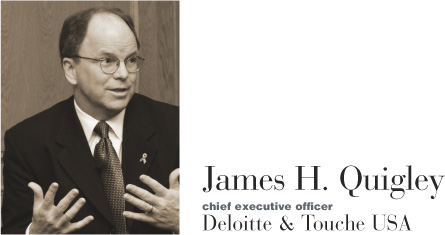
| Since June 2003, James H. Quigley has served as a chief executive officer of Deloitte & Touche USA, the nation's second-largest accounting firm. In more than 30 years in the accounting industry, Mr. Quigley, a graduate of Utah State University, has managed Deloitte's northeastern US practice, led its national manufacturing practice, and served as vice chairman. Mr. Quigley visited Stern to discuss his career and recent developments in the accounting industry with students and faculty. Mr. Quigley was interviewed by Bill Holstein, editor-in-chief of Chief Executive magazine. |
Bill Holstein: You grew up on a farm. Tell us about that and how you got from there into this path that you've chosen?
Jim Quigley: If you were to come to my conference room you'd find on one wall a beautiful picture of an Aspen forest and on the other wall a picture of the Great Lawn in Central Park. I'm from a small rural community, and there were 92 people in my high school graduating class. But most of my career has been spent in New York, and I really do think of myself very much as a New Yorker.
BH: Well, how did you enter the accounting/auditing path?
JQ: I'm a pragmatist. My father was a forester and his father was a forester and I love the outdoors. But in my freshman year I checked on the employment success of the graduating class of forestry majors at Utah State University. Two of the 100 were successful in obtaining jobs in forestry. The accounting majors were doing much better. As someone who was married and wanted to be able to provide for my family, I shifted into the school of business and into accounting. I haven't looked back.
BH: You worked your way up the ladder the old fashioned way, by doing audits, right?
JQ: The lion's share of my 31 years have been directed to serving clients. I spend tons of time, even today, speaking with and serving clients.
BH: And how was it that you got all the way to the top?
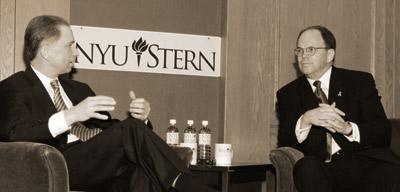 JQ: The CEO is recommended to the Board by a nominating committee, which got input from about 900 of our 2,600 partners. The committee makes the recommendation and the partners elect you to a four-year term. You can be re-elected one time.
JQ: The CEO is recommended to the Board by a nominating committee, which got input from about 900 of our 2,600 partners. The committee makes the recommendation and the partners elect you to a four-year term. You can be re-elected one time.
If a young recruit says he wants to be a partner, I ask them, “How about if we start with you being a successful consultant? And then after you're a successful consultant, let's have you become a successful senior consultant.” And so on. I really believe that I obtained the seat that I have by working aggressively to try to succeed at each step in the process, not by trying to plot a course toward the corner office from the day I was recruited.
BH: This has been an intense period for accounting, with all the corporate failures and new legislation like Sarbanes-Oxley, enacted in 2002. Do you believe the corporate system was fundamentally rotten or it was just a few bad apples?
JQ: I believe that the sustained expansion of the 1990s caused management, boards, perhaps even to some degree auditors, to start to become a little complacent with their essential roles in our capital markets process. It wasn't just a question of a few bad apples. There were some fundamental flaws in that corporate governance model that needed to be addressed. And thus we were given Sarbanes-Oxley, the most sweeping changes in our securities laws in the last 75 years.
BH: What are the major elements of change you see?
JQ: We're now a government regulated profession after 105 years of self-regulation. Audit committees must comprise independent directors. Management is required to certify, under penalty of law, the veracity of their financial disclosures. And then the last and very important and costly requirement was the requirement by management to design systems so they could produce timely, reliable financial information and then document and test those systems. I believe strongly that the risk of fraud in financial reporting has been reduced as a result of all that has been layered into this new model.
BH: What's your estimate of how much more time an American CEO is now spending on regulatory and compliance issues versus five years ago?
JQ: Because CEOs are subject to criminal penalties built into Sarbanes-Oxley, you're seeing a lot more time spent on that activity. Companies have put in place disclosure committees, which review items that should be considered for inclusion in their periodic securities filings. When I sit in the audit committee room and I watch that CEO, he asks the leader of the disclosure committee to provide their report. And I believe the efficacy, the transparency, and the completeness of those financial disclosures has been enhanced as a result. The amount of time that that executive is spending is significant. And I think that's healthy.
BH: Some CEOs would say that the reforms are cascading so broadly through the organization that they're spending so much time implementing and monitoring them that it has taken away from the fundamental challenge of taking risk in the marketplace. Do you agree?
JQ: When I go around the country and talk to CEOs, I ask them very specifically: “Are you doing something different from a risk management point of view or from an investment point of view than you were in the past?” And the vast majority would say that the new project opportunities, the business acquisitions they would have considered five years ago, they're considering today. They're moving forward.
BH: When the government indicted Arthur Andersen after the Enron scandal, a huge firm disappeared. Did that create a shortage of manpower in the industry? And has the profession cleaned itself up since then?
JQ: I'm not an Andersen apologist, and I'm not sure there was the need to 'clean up' the entire profession. Are we performing at a high level? Absolutely. Do we take our professional responsibilities and our commitment to the public interest to heart? And are we executing in a way that we believe we earn that sacred trust and right and that high standard to which we're held? I believe the answer to that is yes. And we're working aggressively to try to be even more effective in executing. We've added 2,000 people to our audit team in the past two years. We've spent tens of millions of dollars in training and our people have worked very, very hard to execute this new layer of responsibility imposed by Sarbanes-Oxley.
BH: And you said earlier that you would hire another thousand this afternoon if you find them.
JQ: I would indeed.
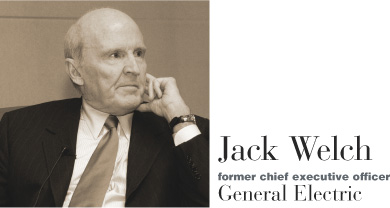
Jack Welch, one of the best known and most influential chief executive officers of the 20th century, began his career at General Electric Company in 1960, and in 1981 became the company's eighth chairman and CEO. During his 20-year tenure at the helm of GE, Welch reshaped the massive company and its culture, and increased GE's market capitalization by an astounding $400 billion. After his retirement in 2001, Welch launched his own firm, Jack Welch, LLC, to advise a small group of CEOs of Fortune 500 companies. In 2005, he published the best-seller, Winning, which he co-authored with his wife, Suzy Welch. In an April 19 appearance at NYU Stern, Welch discussed leadership and management with students and professors. Batia Wiesenfeld, Stern associate professor of management and organizations, moderated the discussion. |
Batia Wiesenfeld: What are the top three qualities that led to your success at GE? And what personality and character traits do you see as being essential to the modern manager?
Jack Welch: Without question, it's the understanding that the only way you win is to get great people around you. You always want to hire somebody smarter than you are. Then, I think I really care a lot about people. I love to see them flourish. To me, it's the most exciting part of the business. And then, I got lucky.
BW: What was the most difficult managerial problem you faced during your tenure as GE's CEO?
JW: The early days. I took over a company that was perceived to be doing very well and that was well respected. But it was not right for its time. It had too much bureaucracy – 430,000 employees doing $25 billion of business. We had 146 people in planning at corporate. Today we do $150 billion and we have 300,000 employees. So it was not pleasant to be "Neutron Jack." It was not pleasant to have to take out a lot of the overhead. IBM went through the same thing, but 15 years later. It took 100,000-plus people out of the company, and it was a jolting experience because they had promised lifetime employment. The hardest thing you'll ever do is to let people go.
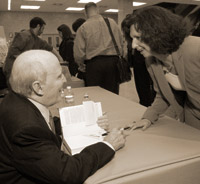 BW: How did GE sustain conglomeration and actually thrive. What were you doing differently than everybody else was doing?
BW: How did GE sustain conglomeration and actually thrive. What were you doing differently than everybody else was doing?
JW: I recognized that the core or the center had three real jobs: people development, the resource allocation of people and dollars, and the transfer of intellectual capital between businesses. The conglomerates of the '60s were three-person headquarters where somebody phoned in the results quarterly. At GE we liked to call it integrated diversity rather than a conglomeration. At our quarterly meetings we would not have somebody come in and drone on about NBC or the airline business. They would come in with a generic idea that could be useful in every business. We developed leaders. And we didn't second-guess people. We didn't worry about picking the colors of refrigerators.
BW: What made it integrated?
JW: When we had trouble with a compressor in appliances, we'd bring materials scientists from aircraft engines to fix it. Integration is using the strengths of the company to transfer intellect across all businesses, not having silos.
BW: GE is known for the concept of market leadership. If a business couldn't be number one or two, you weren't interested in it.
JW: Clearly it's a lot better to be one or two. When you sneeze, number four and five get pneumonia. This was a great mantra to clean out the portfolio. It was a communication tool to tell everybody: “Look, we're not going to carry weak businesses.” But it ends up being stupid. In financial services to try and be number one and number two is outrageous – the playing field is so large. And we carried it about two steps too far. In the end, we had people saying they were number one or two “in the market for brown chairs with curved arms that were this big,” instead of “furniture” or “leather chairs.”
BW: How do you instill integrity in an organization?
JW: You do it through a series of processes and an educational process where you're constantly putting people on the line for integrity tests. But it's beyond the imagination that you've got the only 10,000 good people, or 200,000 good people in the world. Arthur Andersen was a great accounting firm. Then they decided accounting was boring, and they went into consulting. Now, the money was all being brought in by the consultants, the accountants resented it, and they had no fabric left. Enron was a terrific pipeline company, first class. It got energy from Point A to Point B very well. They had coveralls and wrenches to do that. Then they decided they could trade anything, and they had no systems in place to deal with it. Companies like GE, DuPont, IBM – we've made every mistake. When I joined the company we had just come off a price-fixing scandal. So these scandals have to be dealt with and systems have to be put in place to deal with them.
BW: So are you saying that there's no such thing as a culture of integrity, just systems of integrity?
JW: Of course there are cultures of integrity. I'm saying if you train people every single day and you're running tests on them, and you preach integrity every meeting, you will develop a culture of integrity. But in the end, don't be naive enough to think 300,000 people are perfect.
BW: How do you view the role of CEO as changing, especially as it regards the board of directors.
JW: A couple of things have come out of Sarbanes-Oxley. One is the idea of independent directors. I'll give you two examples of how stupid this idea is. If Coca-Cola put a poet or a musician, no offense to either one, on the board, they'd be independent. Warren Buffett, who has billions invested in Coca-Cola and adds all kinds of wisdom, is not independent on the Coke board. Now, you tell me who's going to make the biggest contribution to the company's growth. Boards are there to make the company win, to support the CEO and look at the general strategy. Not to micromanage the company. And what you're seeing now is a lot of micromanaging by scared directors. We used to send our board out to the field three times a year by themselves, visiting the businesses without us. They got a feel for what was happening.

Jack Welch (center) with Batia Wiesenfeld (left) and
NYU Stern Dean Thomas F. Cooley (right).
|
BW: What should MBA programs be doing to prepare students for today's business world?
JW: I think there's not enough emphasis on what you're going to be doing when you graduate. You're not going to be studying disruptive technologies, you're going to be dealing with people, promoting people, motivating them. I mean, I had a PhD in chemical engineering. After a year at GE, I never saw a test tube again, thank God.
BW: What kind of advice do you have for people starting out? What do they have to do right in the first couple of years?
JW: There's one piece of advice I'd give you. Over deliver – make your boss look good. It's as simple as that. And forget all the other stuff about what you wear, how you look, how you say hello. Always surprise them with more than they ask for, and your career will take care of itself.
BW: In your last book, you talked about deep dive projects. And I was wondering what role those had in terms of institutionalizing innovation and leading a large conglomerate?
JW: When you're a CEO, you don't have much, but you have a lot of power. In the book, I used the example of our ultrasound business. It was a $50 million business, floundering around. I went in there and I made the ultrasound project my thing. It was in the back room of a manufacturing place when I got there. We put in money to make it look pretty, and we made it the place to be. I knew nothing about ultrasound. But I knew about making it a big deal. Today ultrasound is a $1.7 billion business; we're by far the market leader; all the good people gravitated to it. So a CEO can go in and put resources behind it. It's one of the luxuries of the job.
BW: Could you just say a few words about how you think the emergence and inclusion of China and India in the market will change the world that we're going to see in the coming decades?
JW: We're going to see low-cost, intelligent labor coming at us as far as the eye can see, and we have to move up the food chain. But I see the cup is clearly half full, not half empty. I'd like to give you perspective of what it was like to become CEO of GE in 1980. The prime rate was 22.5 percent. Inflation was 14 percent. Unemployment was 12.5 percent. The Japanese were going to take over everything in the US. Let's look at us today. Unemployment is at 5 percent. GDP is growing at 4 percent a quarter and has been doing so for the last eight quarters. The prime rate is at four. These are great times. How many people have jobs here? We have entrepreneurs out building businesses and creating niches. We have great ingenuity, and we've got a culture here that accepts everybody from every land.


![]()